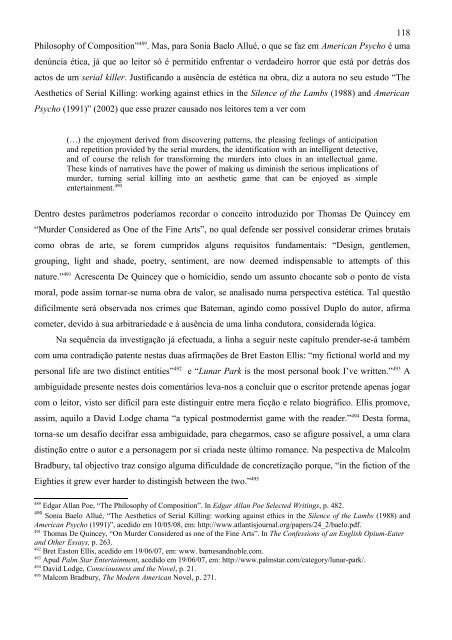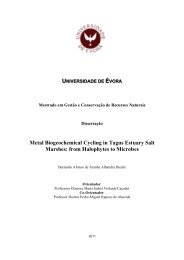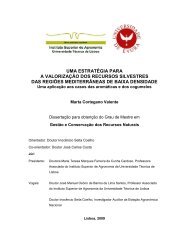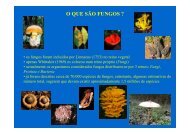João LuÃs Nabo - Index of - Universidade de Évora
João LuÃs Nabo - Index of - Universidade de Évora
João LuÃs Nabo - Index of - Universidade de Évora
Create successful ePaper yourself
Turn your PDF publications into a flip-book with our unique Google optimized e-Paper software.
Philosophy <strong>of</strong> Composition” 489 . Mas, para Sonia Baelo Allué, o que se faz em American Psycho é uma<br />
<strong>de</strong>núncia ética, já que ao leitor só é permitido enfrentar o verda<strong>de</strong>iro horror que está por <strong>de</strong>trás dos<br />
actos <strong>de</strong> um serial killer. Justificando a ausência <strong>de</strong> estética na obra, diz a autora no seu estudo “The<br />
Aesthetics <strong>of</strong> Serial Killing: working against ethics in the Silence <strong>of</strong> the Lambs (1988) and American<br />
Psycho (1991)” (2002) que esse prazer causado nos leitores tem a ver com<br />
(…) the enjoyment <strong>de</strong>rived from discovering patterns, the pleasing feelings <strong>of</strong> anticipation<br />
and repetition provi<strong>de</strong>d by the serial mur<strong>de</strong>rs, the i<strong>de</strong>ntification with an intelligent <strong>de</strong>tective,<br />
and <strong>of</strong> course the relish for transforming the mur<strong>de</strong>rs into clues in an intellectual game.<br />
These kinds <strong>of</strong> narratives have the power <strong>of</strong> making us diminish the serious implications <strong>of</strong><br />
mur<strong>de</strong>r, turning serial killing into an aesthetic game that can be enjoyed as simple<br />
entertainment. 490<br />
Dentro <strong>de</strong>stes parâmetros po<strong>de</strong>ríamos recordar o conceito introduzido por Thomas De Quincey em<br />
“Mur<strong>de</strong>r Consi<strong>de</strong>red as One <strong>of</strong> the Fine Arts”, no qual <strong>de</strong>fen<strong>de</strong> ser possível consi<strong>de</strong>rar crimes brutais<br />
como obras <strong>de</strong> arte, se forem cumpridos alguns requisitos fundamentais: “Design, gentlemen,<br />
grouping, light and sha<strong>de</strong>, poetry, sentiment, are now <strong>de</strong>emed indispensable to attempts <strong>of</strong> this<br />
nature.” 491 Acrescenta De Quincey que o homicídio, sendo um assunto chocante sob o ponto <strong>de</strong> vista<br />
moral, po<strong>de</strong> assim tornar-se numa obra <strong>de</strong> valor, se analisado numa perspectiva estética. Tal questão<br />
dificilmente será observada nos crimes que Bateman, agindo como possível Duplo do autor, afirma<br />
cometer, <strong>de</strong>vido à sua arbitrarieda<strong>de</strong> e à ausência <strong>de</strong> uma linha condutora, consi<strong>de</strong>rada lógica.<br />
Na sequência da investigação já efectuada, a linha a seguir neste capítulo pren<strong>de</strong>r-se-á também<br />
com uma contradição patente nestas duas afirmações <strong>de</strong> Bret Easton Ellis: “my fictional world and my<br />
personal life are two distinct entities” 492 e “Lunar Park is the most personal book I’ve written.” 493 A<br />
ambiguida<strong>de</strong> presente nestes dois comentários leva-nos a concluir que o escritor preten<strong>de</strong> apenas jogar<br />
com o leitor, visto ser difícil para este distinguir entre mera ficção e relato biográfico. Ellis promove,<br />
assim, aquilo a David Lodge chama “a typical postmo<strong>de</strong>rnist game with the rea<strong>de</strong>r.” 494 Desta forma,<br />
torna-se um <strong>de</strong>safio <strong>de</strong>cifrar essa ambiguida<strong>de</strong>, para chegarmos, caso se afigure possível, a uma clara<br />
distinção entre o autor e a personagem por si criada neste último romance. Na pespectiva <strong>de</strong> Malcolm<br />
Bradbury, tal objectivo traz consigo alguma dificulda<strong>de</strong> <strong>de</strong> concretização porque, “in the fiction <strong>of</strong> the<br />
Eighties it grew ever har<strong>de</strong>r to distingish between the two.” 495<br />
489 Edgar Allan Poe, “The Philosophy <strong>of</strong> Composition”. In Edgar Allan Poe Selected Writings, p. 482.<br />
490<br />
Sonia Baelo Allué, “The Aesthetics <strong>of</strong> Serial Killing: working against ethics in the Silence <strong>of</strong> the Lambs (1988) and<br />
American Psycho (1991)”, acedido em 10/05/08, em: http://www.atlantisjournal.org/papers/24_2/baelo.pdf.<br />
491 Thomas De Quincey, “On Mur<strong>de</strong>r Consi<strong>de</strong>red as one <strong>of</strong> the Fine Arts”. In The Confessions <strong>of</strong> an English Opium-Eater<br />
and Other Essays, p. 263.<br />
492 Bret Easton Ellis, acedido em 19/06/07, em: www. barnesandnoble.com.<br />
493 Apud Palm Star Entertainment, acedido em 19/06/07, em: http://www.palmstar.com/category/lunar-park/.<br />
494 David Lodge, Consciousness and the Novel, p. 21.<br />
495 Malcom Bradbury, The Mo<strong>de</strong>rn American Novel, p. 271.<br />
118








